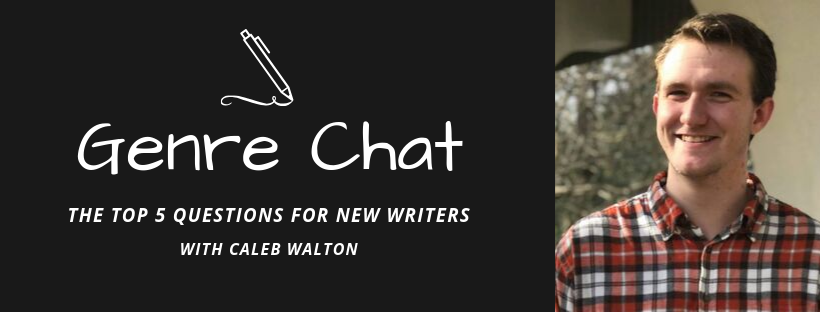
Genre Chat – The Top 5 Questions for New Writers with Caleb Walton
Caleb Walton is a Science Fiction Writer who believes God works miracles through the written word and massive amounts of caffeine. Writing is the purest form of communication, and his passion is to use stories to stretch the imagination and reach deep into the human heart. He is the host of Genre Chat Podcast for Serious Writer Inc., and has been a guest blogger for Almost An Author, one of the 101 Best Websites for Writers by Writer’s Digest. Caleb is also a contributing author for “When God Calls the Heart to Love,” a 30 day devotional based on the award winning television series “When Calls the Heart.” He is currently working on his debut Sci-Fi novel, the Mind Storm.
1. How do I write good characters?
The character is the person in the story that has the most to lose.
No one wants to read a about the apocalypse from the perspective of a character who’s safely hidden in a bunker with plenty of food and never encounters any problems.
Something has to go wrong in their life in order for the reader to want to keep reading. We want to avoid conflict in our own lives, but we HAVE to have it in our novels.
If you’re idea starts with a character, make sure you make them realistic and make sure the right things (or most of the time the worst things) happen to them.
If your idea starts with an event or setting, create a character in the middle of a conflict.
If your story is about the old west, your character could be a school teacher who’s the daughter of the town’s marshal and falls in love with a bank robber.
Immediately you have conflict.
If your story is about a crew traveling to Mars, create a character who gets stuck on the surface alone after the ship is destroyed.
Always keep your character in the center of the conflict.
Do I need an antagonist and a protagonist?
Yes.
But the antagonist doesn’t have to be a human. Not always.
The antagonist: the force that’s working against the main character’s objective.
It’s not a simple good guy/bad guy thing.
In the example I gave about the western, the antagonist could be the town’s marshal, because his goal would be to apprehend the man his daughter loves.
In the sci-fi example, the antagonist could be the harshness of the Martian desserts.
An antagonist doesn’t always have to be a person.
The most common antagonistic situations are:
Protagonist vs. man (classic bad-guy)
Protagonist vs. nature (harsh environment)
Protagonist vs. him/herself (internal struggle)
Protagonist vs. society (1984, but it’s important to have one or more “faces” of the society. I.E. President Snow in the Hunger Games or the Head Elder in the Giver)
2. Which POV should I use?
Simple answer, whichever makes the story better.
Try each of them; they all have their pros and cons.
First person, Intimate connection
The narrator will use the pronouns “I,” “me,” “my,” and “myself,” and describe the supporting characters and their actions from his/her own perspective.
Past Tense –
I placed my hands over the fire, and the heat warmed my skin.
Present Tense – modern usage.
I place my hands over the fire, and feel the heat scorch my skin.
Pro: Draws reader further in.
Con: Can only write from the protag’s perspective.
Third Person, Limited – most common
The story is still told from the perspective of the main character in each scene, but uses the point of view character’s name and the pronouns “he,” or “she.”
John placed his hands over the fire, and felt the heat on his skin.
It is important to remember that the narrator’s knowledge is limited to the thoughts and feelings of the point of view character.
Pro: Can write from more character with line-chapter break
Con: Reader is more dethatched.
*There are more, but these are the most common
3. Should I outline or make up the story as I go?
Some writer’s HAVE to outline.
Some writer’s CAN’T be successful if they outline.
Some writer’s are a mix-up, like me.
Try it both ways and see which one works best.
Either way, have an end goal in mind and know something about the story.
4. How do I tell my character’s back story?
Sparingly.
Back story is important because it reveals important things about the character, but it can bog the reader down and turn them away if revealed improperly.
Reveal it in conversation, or internal dialog.
If the back story is an important event in their past, tell it in a pro-log.
Don’t bog the reader down with pages and pages of back story, especially in the beginning.
A good rule of thumb is not to include major back story within the first forty pages.
5. Where should I start?
Once you have a character and a basic idea of where your story is going, the most important step is to actually start writing.
Where to start? What is the inciting incident in your story?
The inciting incident is the event that takes place that changes the status quo for your character.
What goes wrong in their life that starts them on their inner or physical journey? That’s always a good place to start.
Don’t spend weeks and weeks trying to perfect your beginning, because this will most likely evolve some on it’s own as the story progresses and you get to know your character better.
Just start and see where the journey takes you!
